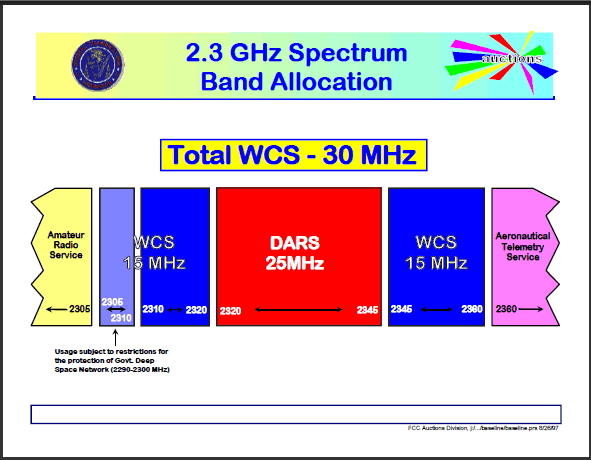 The Federal Communications Commission has called for comment on proposed rules intended to prevent interference between Sirius XM radio (SIRI) and wireless broadband in the 2.3 GHz band area. But when Sirius XM asked for a one week extension on the comment deadline, the organization representing the various wireless companies blasted the request.
The Federal Communications Commission has called for comment on proposed rules intended to prevent interference between Sirius XM radio (SIRI) and wireless broadband in the 2.3 GHz band area. But when Sirius XM asked for a one week extension on the comment deadline, the organization representing the various wireless companies blasted the request.
“At virtually every critical turn in these proceedings, the strategy of Sirius XM Radio Inc. has been the same – delay, delay, delay,” charged a representative of the WCS (Wireless Communications Services) Coalition on Wednesday:
“That is hardly surprising, as Sirius XM has little to gain by adoption of final rules. While those rules will provide Sirius XM with its first permanent authority to operate terrestrial repeaters, those rules are likely to require Sirius XM to modify the terrestrial repeater network that it has been operating pursuant to STAs [Special Temporary Authority permits] for almost a decade, something it consistently has resisted doing. And, adoption of the new rules will subject Sirius XM to new competition from WCS-enabled mobile broadband that provides the public with mobile access to free services like Pandora, Slacker and a range of Internet radio services that largely duplicate, if not improve upon, Sirius XM’s offerings.”
We’ve been following this controversy for a while here at RS. The problem is that licenses in the WCS band and Sirius XM’s SDARS band are scrunched pretty close together, and the FCC worries that SDARS terrestrial repeaters could cause interference to WCS operations. WCS represents Comcast (CMCSA), AT&T, NextWave (WAVE) and other companies that want to launch WiMAX mobile services in their portion of the 2.3 GHz zone.
According to the FCC, its proposed rules “would codify technical and licensing provisions for SDARS terrestrial repeaters. The draft rules also address concerns raised by the National Association of Broadcasters (NAB) about the use of terrestrial repeaters to originate local programming other than that provided by the satellite network directly to SDARS subscribers.”
WCS summarizes the proposals as follows:
First, the staff proposes to restrict the power level at which base stations and mobile devices can transmit, suggesting benchmarks that have been the topic of extensive discussion by all parties, including Sirius XM, for years. Second, it would require that WCS mobile devices employ transmit power control, a proposal that has been commented upon by Sirius XM numerous times since it was first advanced by the WCS Coalition. Third, the staff proposes to ban WCS mobile devices from the 5 MHz of WCS spectrum closest to the Sirius XM allocation, creating the very sort of guardband that Sirius XM has previously advocated. Fourth, it proposes to adopt the very same out-of-band emission limits for WCS mobile devices that Sirius XM has been addressing since before a draft order in these proceedings was scheduled for adoption at the December 2008 open meeting. Fifth, and finally, the staff proposes duty cycle restrictions on WCS mobile devices. While the recommended duty cycle limit is not one advocated by Sirius XM, Sirius XM was the first to advance the concept of duty cycle as a vehicle for regulating interference and has submitted numerous filings on the implications of duty cycle restrictions.
“In short, none of the techniques advanced in the staff proposal for addressing WCS/DARS interference are new to this proceeding, and there is nothing the staff suggests that justifies further delay,” concludes WCS.
The FCC released a schedule for implementing its National Broadband Plan on Thursday. In indicates that the agency plans to issue an Order on this problem sometime between April and June of this year. In other words, very soon.


